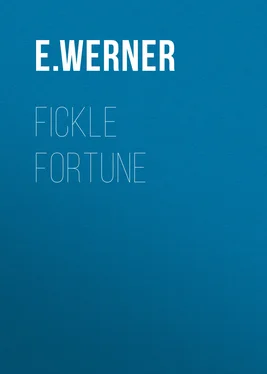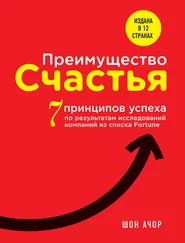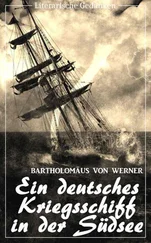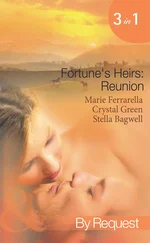E. Werner - Fickle Fortune
Здесь есть возможность читать онлайн «E. Werner - Fickle Fortune» — ознакомительный отрывок электронной книги совершенно бесплатно, а после прочтения отрывка купить полную версию. В некоторых случаях можно слушать аудио, скачать через торрент в формате fb2 и присутствует краткое содержание. Жанр: foreign_prose, foreign_antique, на английском языке. Описание произведения, (предисловие) а так же отзывы посетителей доступны на портале библиотеки ЛибКат.
- Название:Fickle Fortune
- Автор:
- Жанр:
- Год:неизвестен
- ISBN:нет данных
- Рейтинг книги:5 / 5. Голосов: 1
-
Избранное:Добавить в избранное
- Отзывы:
-
Ваша оценка:
- 100
- 1
- 2
- 3
- 4
- 5
Fickle Fortune: краткое содержание, описание и аннотация
Предлагаем к чтению аннотацию, описание, краткое содержание или предисловие (зависит от того, что написал сам автор книги «Fickle Fortune»). Если вы не нашли необходимую информацию о книге — напишите в комментариях, мы постараемся отыскать её.
Fickle Fortune — читать онлайн ознакомительный отрывок
Ниже представлен текст книги, разбитый по страницам. Система сохранения места последней прочитанной страницы, позволяет с удобством читать онлайн бесплатно книгу «Fickle Fortune», без необходимости каждый раз заново искать на чём Вы остановились. Поставьте закладку, и сможете в любой момент перейти на страницу, на которой закончили чтение.
Интервал:
Закладка:
The words breathed of such infinite bitterness of spirit that Edmund's ill-humour vanished instantly.
'You are irritated,' he said kindly; 'and not without reason. But why do you visit your anger on me? I am in no way responsible for yesterday's incident. You know I cannot put myself in open opposition to my mother, even when my views differ decidedly from hers. But in this case she will give way, for if your own rooms next to mine are not made ready for you to-morrow, I shall remove to the side-wing and quarter myself upon you, spite of bats and the accumulated dust of ages.'
The bitter expression vanished from Oswald's face, and he answered in a gentler voice:
'You are capable of it, I believe. But no more of this, Edmund. It really signifies little where I spend the few months of my sojourn here. The rooms in the tower are very quiet, and admirably suited for study. I would far rather be there than here, in this castle of yours.'
'"This castle of yours,"' repeated Edmund, in a tone of pique. 'As though it had not always been as much your home as mine! But I believe you are seeking to estrange yourself from us. Oswald, I must say, if things are not always pleasant between my mother and you, a great share of the blame rests on your shoulders. You have never shown any affection for her, or any ready compliance with her wishes. Cannot you bring yourself to it, if you try?'
'I cannot comply where blind subjection is demanded of me, and where the whole future fortune of my life is at stake–no!'
'Well, then, we may expect another family quarrel at no very distant date,' said Edmund, evidently ill-pleased at the prospect. 'So you will not have any alteration made in the rooms?'
'No.'
'As you like. Goodbye.'
He walked off towards the door, but had not reached it when Oswald came quickly forth from the window-recess where he had been standing, and followed him.
'Edmund!'
'Well?' returned the other interrogatively, and halted.
'I shall remain where I am, in the side-wing, but– I thank you for your kindness.'
The young Count smiled.
'Really? That sounds almost like an apology. I really did not think you were capable of such expansiveness, Oswald;' and suddenly, with an impulse of frank, hearty affection, he threw his arm round his cousin's shoulder. 'Is it true that you cherish a hatred towards me, because Fate has willed that I should be heir to the property, because I stand between you and the Ettersberg estates?'
Oswald looked at him again with one of those strange, penetrating glances which seemed to be searching the young heir's features for something hidden from him. This time, however, the keen scrutiny soon gave place to an expression of warmer, deeper feeling, to a kindlier ray which beamed suddenly forth, melting the icy rampart of suspicion and reserve.
'It is not true, Edmund,' was the steady, grave reply.
'I knew it,' cried Edmund. 'And now we will bury all past misunderstandings. As regards our travelling acquaintance, however, I warn you that I shall summon up all my talent–and you know how justly it is esteemed–to produce an effect at Brunneck. This I shall do in spite of your frowning visage and of my mother's high displeasure. And I shall succeed in my endeavours, you may rely upon it.'
So saying, he caught hold of his cousin's arm, and drew him laughingly from the room.
CHAPTER III
Brunneck, the residence of Chief Councillor Rüstow, was situated only a few miles distant from Ettersberg, and had been in the hands of its present proprietor for a long series of years. It was a property of considerable extent and value, comprising various farms, and furnished with every improvement which modern science has devised. On all agricultural subjects the Councillor was looked upon as a first-class authority, and as, in addition to this, he owned one of the finest seigneurial manors of the province, his position was one of great influence. Brunneck could not, indeed, compare with the vast Ettersberg domain, but it was generally asserted that, in point of fortune, Rüstow was to the full as good a man as his noble neighbour. The numerous reforms he had introduced on his estates, and to the number of which he was with indefatigable energy constantly adding, had in the course of time become handsomely remunerative, and were now a source of wealth to him; whereas over at Ettersberg the management of the land was left almost entirely to underlings, and was conducted on so lofty and aristocratic a principle, that pecuniary interests were overlooked, and any tangible, practical return rendered out of the question.
As has already been stated, the two families were connected by marriage, but this circumstance was ignored on both sides with equal obstinacy and hostile feeling. In the position he now occupied, the Councillor might more fitly have ventured to sue for the hand of a Fräulein von Ettersberg. Twenty years or more ago, the young gentleman-farmer who had come to Dornau to pick up some knowledge of his future vocation, and who had but a slender fortune to rely upon, was certainly no suitable parti for the daughter of the house. The young people fell in love, however, paying little heed either to prejudices or obstacles.
When their elders harshly interfered and separated them, when all resistance, all entreaties, failed to move them, Rüstow persuaded his betrothed, who meanwhile had come of age, to take a decisive step. She left her home clandestinely, and the marriage was celebrated, without her father's consent, it is true, but with all due formality. The young couple hoped that, this step being once irrevocably taken, forgiveness would follow, but this hope proved illusive. Neither the young wife's oft-repeated overtures, nor the birth of a grandchild, not even the rapidly ensuing change in Rüstow's circumstances–he achieved wealth and position in a marvellously short time–could appease the father's wrath. The old Count was too completely under the influence of his relations, who looked on the middle-class connection with horror and aversion, and used every means in their power to strengthen him in his hard resolve.
Frau Rüstow died without having obtained pardon, and at her death all chance of a reconciliation vanished. Her husband had, from the first, openly avowed his dislike to a family which had so cruelly wounded his pride and self-love. For his wife's sake alone had he tolerated the former attempts at peacemaking; now that he had no longer her to consider, he assumed towards his father-in-law and the entire clan an attitude of hostility and surly defiance which precluded any intercourse. As a result of these tactics came the will which passed over the granddaughter, and, without even a mention of her or her mother assigned Dornau to the heir of the entailed family estates. This will was contested by Rüstow, who would not admit of his marriage being thus altogether ignored, and was determined to have his daughter acknowledged as her grandfather's legitimate successor and heiress. The suit had some base to rest upon, for the deceased had not disinherited his grandchild in so many words. He had contented himself with treating her as nonexistent, and had proceeded to dispose of his property in the manner which seemed to him good. This lapsus, and a few technical errors subsequently detected, rendered the will assailable. The issue was, however, most uncertain, and the lawyers on both sides had full opportunity of exercising their sagacity and judgment.
The Brunneck manor-house was neither so vast nor so imposing of aspect as Castle Ettersberg, yet it was a stately building, spacious, and bearing all the marks of age. The inner arrangements of the house, though boasting no pretence at luxury, were ordered on a scale suitable to the position and the fortune of the owner.
Читать дальшеИнтервал:
Закладка:
Похожие книги на «Fickle Fortune»
Представляем Вашему вниманию похожие книги на «Fickle Fortune» списком для выбора. Мы отобрали схожую по названию и смыслу литературу в надежде предоставить читателям больше вариантов отыскать новые, интересные, ещё непрочитанные произведения.
Обсуждение, отзывы о книге «Fickle Fortune» и просто собственные мнения читателей. Оставьте ваши комментарии, напишите, что Вы думаете о произведении, его смысле или главных героях. Укажите что конкретно понравилось, а что нет, и почему Вы так считаете.












